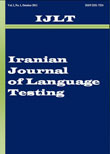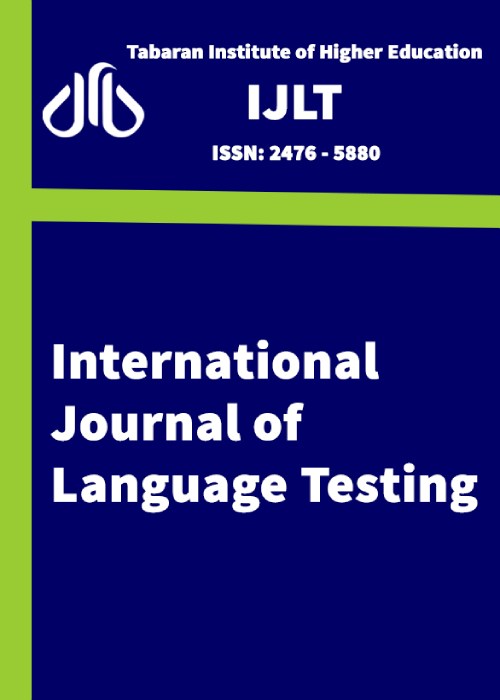فهرست مطالب

International Journal of Language Testing
Volume:5 Issue: 2, Oct 2015
- تاریخ انتشار: 1394/10/11
- تعداد عناوین: 5
-
Page 78Three major potential sources of construct-irrelevant variability in the test scores can be the tasks, rating rubrics and rater judgments. The variance caused by these facets of assessment in the test scores is a threat to the dependability, and in turn, generalizability of the test scores. The generalizability of the test scores need to be empirically investigated; otherwise, no evidence can support the generalizability inferences made based on the test scores. The current study employed univariate generalizability theory to investigate the different sources of variance in the test scores and the dependability of the scores obtained from the Columbia University placement (CEP) speaking test (N=277). Moreover, this study used multivariate generalizability theory to look at the dependability of the individual scores obtained from the four scales of the analytic rubric of the test. Finally, justifiability of combining scores from the four analytic rubric scales to make a composite score was investigated. The univariate results revealed that the dependability of the scores of CEP speaking test is high enough to be taken as a consistent measure of the speaking ability of the test takers. The multivariate results showed that the high correlation between the four rating scales of the test and their almost equal effective weights in the composite score makes it justifiable to combine the four scores of the four scales to report a composite score. The present study can contribute to the understanding of L5 assessment researchers of the application of generalizability theory in their reliability and generalizability investigations.Keywords: Generalizability theory, Performance assessment, Reliability
-
Page 91This review discusses the written sections of the New Hanyu Shuiping Kaoshi (the New Chinese Proficiency Test, commonly known as the New HSK), a standardized test developed to measure the proficiency level of non-native speakers of standard Chinese. The test is administered and published by the Office of Chinese Language Council International under the Higher Education Department, Ministry of Education, People’s Republic of China, and has the largest number of test takers among all the tests of Chinese as a foreign/second language. The review gives a brief introduction to the history and characteristics of the test, reports on recent research about its reliability, validity, and fairness, and evaluates its strengths and weaknesses.Keywords: The New HSK_Chinese as a second language_standardized test
-
Page 104Students‟ assessment has numerous benefits like engaging students with their learning, and making them aware of their weaknesses. This study attempts to investigate the role of selfassessment and peer-assessment in promoting autonomy in language use with a focus on speaking skill. To carry out the research 74 EFL Iranian learners with the similar level of proficiency were chosen among 220 learners, and were put into two groups: experimental (n=57) and control (n=57). Then, they were given a pre-test on learner autonomy, and a pre-test for their speaking ability. In experimental group, the teacher provided the learners a series of activities through which they were asked to evaluate their peers'' language during 25 sessions. In the control group, without any change in their common teaching and learning process, the students were required to assess their own language. Finally, both groups of students were asked to take the same tests as post-test. The results of data analysis showed that the participants in experimental group outperformed those in control group revealing the positive effect of peerassessment on leaners'' autonomy. Furthermore, the results of analysis of data from speaking test indicated that there is a significant difference between experimental and control group. It can be concluded that peer-assessment has more significant effect on EFL learners‟ autonomy and speaking skill than self-assessment.Keywords: Learner's autonomy, Self, assessment, Peer, assessment, EFL
-
Page 114This study aimed to explore the causes, consequences, strategies, and perceptions of Iranian learners in the FCE speaking test. The instruments employed in this study included an IELTS proficiency test, FCE speaking test, observation scheme, and learner interview in order to measure the male and females’ perceptions of the quality of FCE tests, the causes of test anxiety in such tests and how they could be reduced or controlled. To this end, 53 female and 52 male Iranian English learners, studying FCE at a language institute in Tehran, were randomly chosen. Being homogenized via an IELTS test, 44 female and 43 male students, aged 26-24, were selected. While the 76 participants were taking part in the FCE speaking test, an observation was held on their performance. Finally, 21 female and 21 male participants were picked through convenience sampling and engaged in a semi-structured interview. The data gathered from the observations and interviews was content analyzed. The data analysis findings, using descriptive statistics, revealed that the females had a better perception toward four out of the six qualities of the test. The most disturbing criteria for their test anxiety were stress, being nervous, and becoming scared of not being able to pass. Some participants suggested having more practice tests before the exam to reduce test anxiety. Additionally, some symptoms of anxiety were selected to be observed to realize the reactions the participants showed when they became anxious. All of the selected signs except twisting hair were mostly spotted in the males. Moreover, the male participants showed more symptoms of test anxiety in all parts of the FCE speaking test. The findings of this study have generated a number of important implications for future practices which are significant for teachers, test developers, learners, and other stakeholders.Keywords: Test anxiety, FCE, test quality, learner's perception, speaking test
-
Page 144Test administration conditions, namely, the timing of the test, the testing venues and the exam proctors/inspectors are influential factors that may introduce construct-irrelevant variance to a test, if ignored, and therefore render a test invalid, especially in the case of high-stakes tests. The purpose of the present study was to investigate the satisfaction of the PhD exam candidates with the administration conditions of the General English section of theNationalIranian PhD Entrance exam, focusing on the three above mentioned factors. The timing factor was investigated from the perspectives of suitability of the time, that is, morning administration, evening administration and time delay in administration. The testing venue included the location of testing venues, commuting, finding seats, ventilation and lighting of the venues and finally, the proctor/inspector factor looked into the presence of the inspectors, satisfaction with the behavior of the proctors, peacefulness of the session, refreshments and finally the possibility of cheating.The data were collected by a sixteen item questionnaire which was distributed among 242 PhD exam candidates, both males and females, in 20 different testing venues all over Iran. The results indicated that they were satisfied with all three factors and the entire exam administration process; however, they made some comments to improve the exam administration process.Keywords: Test Administration, Testing Venue, Timing, Proctors, Inspectors, Iranian National PhD Entrance Exam


